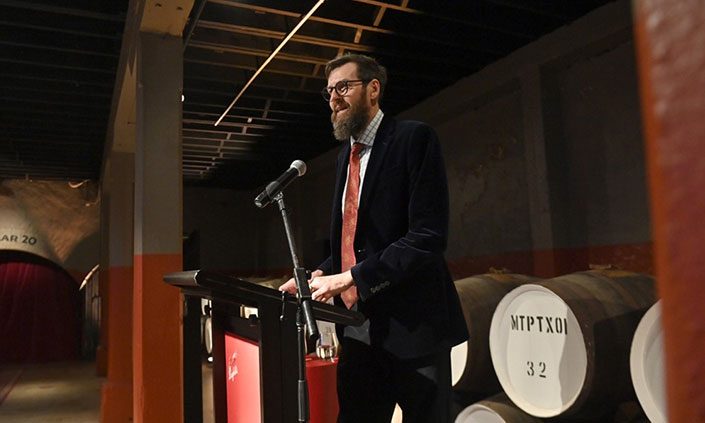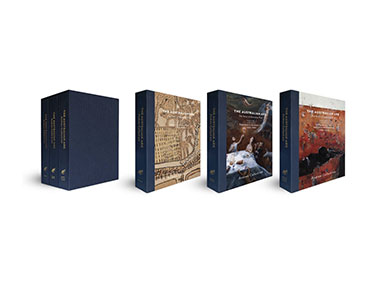A wider world view
David Longfield brings culturally significant books to life, challenging conventional narratives and the boundaries of publishing.

"We produce books we love, to the standard we are proud of," says David Longfield, Macquarie University Bachelor of Arts (Literature) graduate and founder of Longueville Media, the niche publishing company he established in 2002 that turns the traditional publishing model, which relies completely on retail sales, on its head.
"The high-quality non-fiction books we publish are self-funded by individuals, businesses, government agencies, academic institutions and not-for-profits," explains Mr Longfield. "The old commercial publishing risk model simply doesn’t work for every book because some important, well-researched books just don’t have a large enough market to be commercially viable."
"This model allows us to publish rigorously researched and beautiful books, irrespective of the size of the market, fulfilling specific needs for a small community and allowing for greater diversity in publishing. The funding concept behind a book doesn’t necessarily dictate its quality," he adds. "There are plenty of talented writers working on projects that are of great importance but may never recoup the cost of production."
The Australian Ark – a three-volume history of the Australian wine industry from 1788 to the present, which Longueville Media recently published – is a perfect example. A seminal work by Master of Wine Andrew Caillard – and winner of Britain’s André Simon Awards 2024, the world’s most prestigious food and wine book prize, plus a dozen other awards – The Australian Ark provides a fascinating and valuable new perspective on Australian history.
"Andrew spent nearly 20 years writing and researching this comprehensive examination of how Australia’s culturally and economically important wine industry has evolved since its earliest days," says Mr Longfield, who notes that Caillard’s research clearly shows that early European settlers came to Australia with the ambition of creating a fine wine industry to rival that of France.
"Australia, labelled a New World producer by the traditional European centre of power, actually has some of the oldest vines in the world, and Andrew successfully draws together the generational stories that highlight the experience, expertise, passion and hard work that have made Australia a global centre of wine-making excellence."

No less fascinating is the exceptional production quality The Australian Ark embodies across paperback, hardback, premium linen and full-grain leather versions – there’s even a $20,000 hand-bound edition by a master German bookbinder who came out of retirement for the project – and the investment it garnered.
"We were determined to find a way to publish it, and primarily through the author’s industry and personal contacts, AU$1.2 million was raised to produce the work to the standards we all agreed it required," says Mr Longfield. "By the time Andrew finished the manuscript, editing was complete and the book designed, it was half a million words, 1,100 images and 1,760 pages over three volumes."
Working collaboratively, the core team included half a dozen people, and the result is a stunning example of the kind of books Longueville Media produces, whether that’s a corporate history, narrative non-fiction, research report or commemorative book. It has also almost sold through its 5,500 copies – an enviable number in a constantly evolving and increasingly competitive publishing landscape.
More than a one-off book project, however, the project is intended to be a legacy for the Australian wine industry, and Australian history in general. "Andrew was very keen that publication wasn’t the end of the process – we’re confident it will spawn new research, new publications, and keep the story going. There’s also a clear not-for-profit vision for the book to ultimately provide more research in the industry and support wine writers. It’s also proudly printed in Australia."
Ambitious, yes. Successful, very. So, what’s been the secret to Mr Longfield’s enduring business in an industry that’s not just fickle, but has had to meet head-on the significant challenges of the internet, changing readerships and, more recently, AI. "Longueville Media is like most small businesses – you have to remain nimble and flexible about the type of work you undertake, and also move fast to embrace opportunities as they arise."
"For example, only one year into the business, I was fortunate to be able to publish what turned out to be one of Professor Coral Bell’s final books: A World out of Balance. Professor Bell was one of Australia’s leading experts in international relations, and the book was launched by Alan Gyngell, the director of the newly formed Lowy Institute for International Policy."
The collaboration led to Mr Longfield helping the institute set up its publishing program, which resulted in almost 12 years of work. "That same year," he continues, "I published a revised edition of the late James Dunn’s East Timor: A Rough Passage to Independence. Through that book, I met the then-East Timor Consul-General Abel Guterres, Prime Minister Xanana Gusmao and President José Ramos-Horta, and so Longueville Media began what has been a 22-year relationship with Timor-Leste."
This consulting and publishing management work also led to the company winning state and federal government publishing and writing contracts. "Thanks to a great team of people, who bring a range of specific skillsets, we’ve been able to confidently pursue work I never would have considered as part of my original vision for Longueville Media."
Ghostwriting is the latest evolution of the business that now publishes anywhere from 10 to 15 books a year, depending on their complexity. The next major titles in production are two winery histories, and a multi-volume history of Timor-Leste for senior high school and university students.
"There’s actually no accessible history of the country that’s specifically written for the growing number of Timorese students," explains Mr Longfield. "Dunn’s book is a fairly academic title, and the country has moved on from the resistance days. What we are producing is a series by Timorese and international authors that will help tell the long history of the country."
Mr Longfield says his interest in challenging conventional, external narratives was first fostered during his Literature degree at Macquarie University. "The English faculty was incredibly progressive at the time – it was cutting-edge," he notes. "When other English departments were centred around the canon, Macquarie was embracing the deconstructionist movement and offering amazing coverage, for example, in post-colonial literature."
"I didn’t realise it while I was studying, but on reflection, I have both embraced and been influenced by the post-colonial literature units I studied under Rosemary Colmer and others. Seeing firsthand the perspectives and breadth of writing from local voices in African and Asian countries provided a different centre of focus and, it’s fair to say, a wider worldview" – something Mr Longfield continues to champion in the range of books he publishes and is rightfully proud of.

David Longfield's bio
David Longfield graduated from Macquarie University with a Bachelor of Arts (Literature) (1991). He began his publishing career at Oxford University Press Australia, working as an academic sales representative before advancing to the role of humanities and social sciences marketing manager.
Mr Longfield then transitioned to an academic commissioning editor position at Thomson Reuters (formerly The Law Book Company), where he developed new titles for the undergraduate and postgraduate law markets. Subsequently, he joined Text Media, managing corporate magazines for The National Trust, Clayton Utz Lawyers, Fujitsu and Microsoft.
In 2002, Mr Longfield founded Longueville Media, a multi-award-winning custom publishing company with more than 650 books on its list. Specialising in a diverse range of topics and formats, its portfolio includes full-colour coffee-table books, corporate and government histories, small business showcases, academic monographs, personal life stories and finely crafted poetry books.